8 Easy, Low-Cost Home Improvements You Can Do in One Weekend to Save Money on Your Household Bills
By Julie Jaggernath
Whether you’re a renter, new to home ownership, or a seasoned pro, it’s wise to watch out for quick and easy tips that will save you money on your household bills and expenses. However, the problem with some home improvement lists is that it takes too much time and/or money, both of which can be in short supply, to implement the improvements.
Being responsible for a home and saving money on bills and expenses, whether you own it or rent it, means finding ways to balance true home improvements with changes to how you do things. Here are 8 things you can do in one weekend to start saving money right away:
Tip #1: Keep Your Fridge, Freezer and Deep Freeze Full
Fridges have the dubious distinction of being one of the most expensive household appliances to run, and freezers aren’t far behind. However, keeping fridges at least partially full, and freezers fairly full, helps make them more energy efficient.
When you open the door of your fridge, much of the cold air inside escapes. But if you have filled jars, bottles, containers and other items taking up space and retaining the cold, it won’t take your fridge as long to bring the temperature back down again once you close the door. Fridges need room for air circulation inside of them, but freezers do not. Freezers work best when they’re fairly full, so if you have a freezer that isn’t needed, unplug it and store it safely. This applies to other appliances as well.
If you don’t have quite enough to “fill” your freezer, partially fill clean, empty plastic milk jugs or cartons with water. These not only take up freezer space and retain the cold when you open and close the door, they are perfect for using in a cooler or smashing for crushed ice when needed. If your refrigerator is too empty, make your own bottled water supply. It will not only make your fridge more efficient, it will help save water because no one will need to let the tap run to get a cold drink.

However, an even better way to stock your fridge and freezer for energy savings is to create meal plans with left-overs. It will save money on groceries as well as eating out.
Tip #2: Install a Programmable Thermostat (and Use It!)
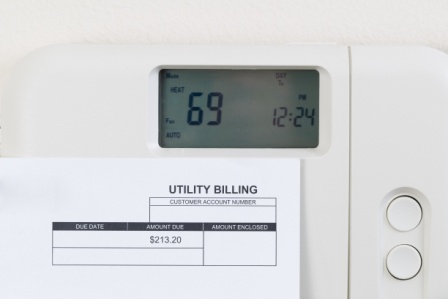 The benefit of a programmable thermostat is that you don’t have to remember to turn the furnace or air conditioning down when you leave or go to bed. The thermostat does this for you based on the presets you give it. This saves money by not running expensive appliances when they’re not needed. It can keep the temperature in your home stable, within 2 or 3 degrees from high to low. Avoiding extreme fluctuations also saves money because the appliances don’t have to compensate for dramatic changes.
The benefit of a programmable thermostat is that you don’t have to remember to turn the furnace or air conditioning down when you leave or go to bed. The thermostat does this for you based on the presets you give it. This saves money by not running expensive appliances when they’re not needed. It can keep the temperature in your home stable, within 2 or 3 degrees from high to low. Avoiding extreme fluctuations also saves money because the appliances don’t have to compensate for dramatic changes.
Shop around for a fairly priced thermostat. While it may seem convenient to be able to control it remotely with your smartphone, that may defeat the benefits of letting the program do it for you. All programmable thermostats also come with manual controls. If you’re home and need more heating or cooling, the push of a button to temporarily over-ride the system is all it takes.
Tip #3: Lower the Temperature on Your Hot Water Tank
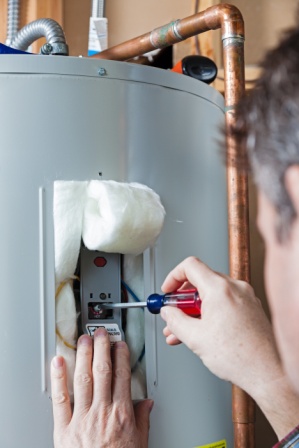 If you have a hot water tank that is maintaining your hot water supply at a very high temperature, turn it down to save money, energy and for safety reasons. The ideal temperature should be between 55 and 60 degrees Celsius (130 and 140 degrees Fahrenheit) according to BC Hydro. No one likes a cold shower, and neither should anyone risk getting burned (least of all by their bills).
If you have a hot water tank that is maintaining your hot water supply at a very high temperature, turn it down to save money, energy and for safety reasons. The ideal temperature should be between 55 and 60 degrees Celsius (130 and 140 degrees Fahrenheit) according to BC Hydro. No one likes a cold shower, and neither should anyone risk getting burned (least of all by their bills).
Tip #4: Buy a Clothes Rack, Install a Drying Rod or Put Up an Outdoor Clothesline
 If you can hang up a few items from every load you’ll save money every time you turn your dryer on. Or throw a dry towel in with your wet clothes to speed up drying time. Dryers have the dubious distinction of being one of the most expensive, but arguably, most convenient, household appliances to operate. If you can hang up even 25% of each load, you’ll not only save drying time and electricity, you’ll extend the life of your clothes.
If you can hang up a few items from every load you’ll save money every time you turn your dryer on. Or throw a dry towel in with your wet clothes to speed up drying time. Dryers have the dubious distinction of being one of the most expensive, but arguably, most convenient, household appliances to operate. If you can hang up even 25% of each load, you’ll not only save drying time and electricity, you’ll extend the life of your clothes.
Tip #5: Change Some Lights Over to Use LED or CFL Bulbs
Saving money isn’t about all or nothing changes – small changes count too. Remove incandescent light bulbs from lights that you use most often or are prone to leaving on accidentally. CFL and LED bulbs have become a little more affordable over the past few years, but changing over all of the bulbs in your home all at once would be quite the expense. Start with a few and buy for other light fixtures as bulbs go on sale. Also get everyone in your house used to turning the lights off when they leave a room. This habit alone will save on your electricity bill.
Tip #6: Use Your Dishwasher Efficiently
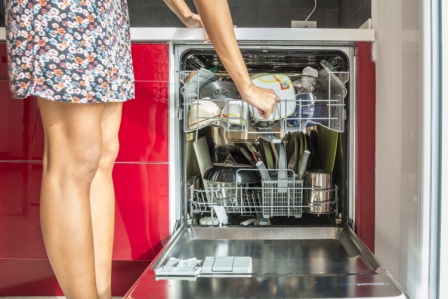 Depending on the age and make of your dishwasher, it may or may not be more efficient than hand-washing your dishes. Finding out for sure either way might be more work than it’s worth because no matter how efficient your dishwasher is, when it comes to saving money, some simple changes to how you use it will do it.
Depending on the age and make of your dishwasher, it may or may not be more efficient than hand-washing your dishes. Finding out for sure either way might be more work than it’s worth because no matter how efficient your dishwasher is, when it comes to saving money, some simple changes to how you use it will do it.
If you can’t tell by looking at the settings, dig out the manual or check online how to set it to wash only using the quick or light cycle (avoid the longer-running, deep-cleaning or pots and pans cycle) and how to turn off the heat for the drying cycle. While you’re at it, clear a space on the counter for a good drying rack. Hand wash all of your bigger items, e.g. pots, mixing bowls and frying pans, anything that hogs a lot of space in the dishwasher. Then, only run your dishwasher when it’s full.
Tip #7: Organize Family Charging Stations to Reduce Power Leakage – This Will Also Keep Track of Charging Cables
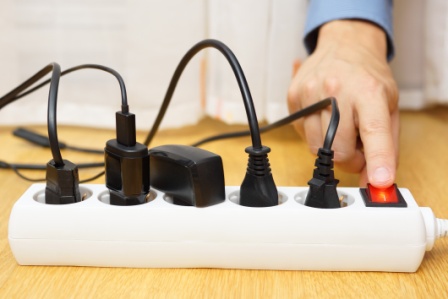 You’ve probably heard that anything that remains plugged in to the wall, even when the item or appliance is turned off, it still draws power. Each turned off item only draws a tiny bit of power, but combined over time, you’re paying for a lot of unused electricity.
You’ve probably heard that anything that remains plugged in to the wall, even when the item or appliance is turned off, it still draws power. Each turned off item only draws a tiny bit of power, but combined over time, you’re paying for a lot of unused electricity.
While it’s likely not reasonable to get everyone in your household to unplug every device, appliance or charging cable they’re not using, it is possible to set up charging stations with power bars.
If you have teenagers with multiple electronic devices, put a power bar in each of their rooms to consolidate charging cables and to make it easy to turn off/unplug them all in one shot. For others in your home, you might find that setting up a charging station in the kitchen, office or living room is a better location. There are no rules; the ideal location is where it’s easiest to use.
Tip #8: Take a Good Look at Your Windows
Windows can help you save money and reduce utility bill costs, or contribute significantly to the heating and cooling costs of your household. However, replacing old or single pane windows is costly. Before you incur that expense, look at your window coverings, both from inside as well as outside your home. Can you hang heavy curtains that block the sun in the summer and insulate against the cold in the winter? Would a bamboo sun-shade or awning help from the outside? Consider sealing drafts around your windows with caulking or weather stripping, installing window film or replacing a few windows each year, starting with the ones that leak the most money from your bank account.
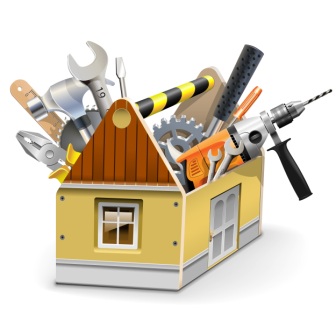
For More Money Saving Home Improvement Tips for Around the House
Sometimes the best improvements are with our own habits, and this couldn’t be truer than with this ninth tip: save up for routine home maintenance and repairs rather than relying on a line of credit or credit cards. The money you’ll save by not going into debt is worth considering as much an investment in your future as owning your own home.
If you are a new homeowner, or plan to be one soon, a tenth tip to round out the list is – learn how to do basic home maintenance yourself. Over the years, this will save you money, even if you only use your knowledge to ask good questions when you hire a professional for what you need done. Knowing how to do some basic work around your place is all part of learning how to maintain and repair a house to keep it feeling like the home you love.
Related articles
If Saving Money is a Good Idea, Why is it So Hard to Find the Money to Save?
Free, Online Workshop – 75 Ways to Save Money on Household Expenses



Awesome tips! Saving on household bills is all about smart choices and consistency. This post makes it easy to get started.